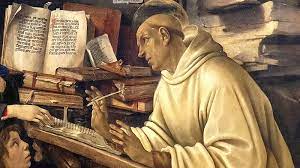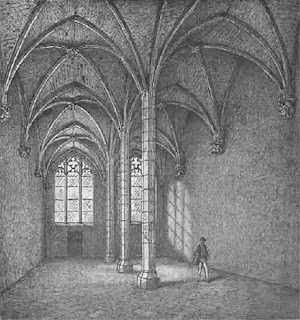According to Oswald's biographer, Byrhferth of Ramsey (writing years later), Oda's father was a Dane who arrived in 865 with a Viking army and settled in East Anglia. Byrhtferth writes that Oda was a member of a nobleman's household, and accompanied the man on a pilgrimage to Rome, during which Oda cured the man's illness. We don't know his date of birth, but he was old enough to become Bishop of Ramsbury by 928.
William of Malmesbury (c.1095 - c.1143) tells a different story, about Oda as a soldier under the Saxon king Edward the Elder and becoming a priest later. Biographers erroneously call him Bishop of Wilton, but evidence doesn't exist for that appointment.
It was likely King Æthelstan who appointed Oda Bishop of Ramsbury, and made him a royal advisor. Oda's name is on a lot of royal charters as witness. Another historian, Richer of Rheims, tells us that Æthelstan sent Oda to France to help King Louis IV (whose queen was Æthelstan's granddaughter through Edward the Elder) to return to the throne. (This story has no contemporary evidence.) Oda was also said to be with Æthelstan at the Battle of Brunanburh, but there is no contemporary evidence of this. These later accounts that ascribe so much to his life tell you that there was a desire to increase his standing because he was considered important to history.
What did happen for certain is that he was made Archbishop of Canterbury after the death of Wulfhelm in 941. In either 945 or 946, at Easter, new law codes were proclaimed by King Edmund that included new ecclesiastical laws developed by Oda and Edmund. Oda also established his own set of rules for clergy, in a work called Constitutions. In it, he dropped any references to dealing with pagans.
As archbishop he supported Dunstan's monastic reforms, and would have been helpful to Oswald, who was Oda's nephew and became Archbishop of York.
Other actions by Oda: renovating Canterbury Cathedral by raising the walls and installing a new roof, building several churches, translating the relics of St. Wilfrid. He also acquired relics of 7th-century Frankish bishop St. Ouen. He was nicknamed both "the Good" and also "the Severe."
He is venerated in both the Roman Catholic and Eastern Orthodox Churches with a feast day on 4 July. That's him in the illustration holding a chalice.
Let's make a change away from religious figures for a bit and take a look at the invasion that brought Oda's father to England, the Viking army of Ubba and Ivar. See you tomorrow.




